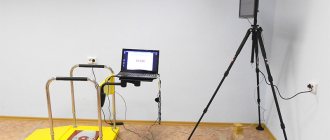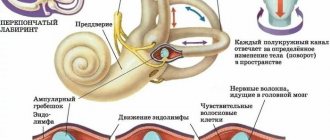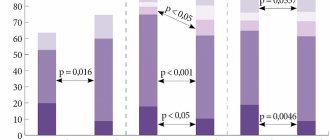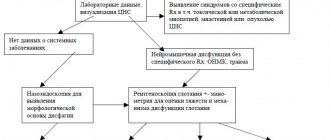If you make a rating of the most disliked symptoms of diseases by doctors, then dizziness will occupy one of the leading positions. Experts explain this by saying that the disorder is characteristic of completely different female pathologies. How to determine what are the causes of dizziness with normal blood pressure in women?
Mental and external causes
Dizziness can be associated both with physiology and with various diseases.
Apathy and a feeling of weakness periodically occur in every person. With severe overwork, the body reduces activity and metabolic processes, trying to conserve energy reserves. These are natural defensive reactions that can be easily eliminated without medication.
Doctors identify physical causes of frequent dizziness and drowsiness associated with an unhealthy lifestyle:
- Chronic insomnia. With frequent flights and night shifts, a malfunction of the autonomic nervous system occurs. The problem appears with shallow sleep, the habit of falling asleep with the TV on, and emotional overload. When resting is resumed, symptoms disappear within a few weeks.
- Stressful situations. After suffering a breakdown or the loss of a loved one, mental stress occurs. A large amount of adrenaline is released into the blood, which tones the blood vessels. The nervous system malfunctions and takes a long time to recover, so fatigue persists after a vacation, weekend, or sound sleep.
- Autumn blues. During the cold season, the body requires vitamin D for healthy metabolism and immune support. A lack of ultraviolet radiation leads to the development of a condition reminiscent of depression.
- Meteor dependence. With low blood pressure, women often react to changing weather, complaining of apathy, muscle weakness and pain.
- Physical exercise. When performing certain exercises, a man may experience a sharp rise in blood pressure. The vessels do not have time to pump large volumes of blood to the brain, overwork and hypoxia occur.
The listed reasons are natural, but it is not recommended to ignore the symptoms: the risk of developing somatic diseases increases. This threatens bronchial asthma, diabetes, and neuroses.
Problems with hormonal disorders in women
Premenstrual syndrome can cause dizziness.
Dizziness and drowsiness are symptoms characteristic of premenstrual syndrome. After ovulation, a woman's body produces hormones that can cause swelling. A spasm of small vessels occurs, oxygen supply decreases, a feeling of weakness and irritability appears.
Unpleasant symptoms may occur due to the following characteristics of women's health:
- Heavy menstruation with large blood loss leads to anemia. The problem becomes aggravated after an abortion, against the background of fibroids, after gynecological operations, in teenage girls.
- Hormonal imbalance during menopause leads to decreased vascular tone. The intensity of blood flow decreases, internal organs may experience oxygen starvation. Depression, chronic insomnia, and decreased activity often develop.
You feel dizzy and often want to sleep in the first and last trimester of pregnancy. A woman's hormonal levels change and a large amount of progesterone is produced. It lowers blood pressure, slows down metabolism, and affects the neuroendocrine regulation centers of the brain. After week 12, the hormone level normalizes, the body adapts to the changes, and performance and activity increase.
Diagnostics
To make a diagnosis, the patient must undergo a series of instrumental and laboratory tests and consultation with specialized specialists (neurologist, cardiologist, ENT specialist, ophthalmologist).
When collecting complaints, it is important for the doctor to find out the duration of dizziness, the circumstances under which it appears, accompanying symptoms, frequency of occurrence and names of medications that the patient is currently taking.
Hardware methods recommended for general weakness and dizziness:
- radiography;
- MRI;
- vestibular tests;
- electroencephalogram;
- ECG;
- Ultrasound of cerebral vessels.
After receiving the results, the attending physician will prescribe a course of treatment and monitor its implementation. In our center you can undergo a full examination of the body with a detailed interpretation of the results.
Signs of nervous exhaustion
Apathy is a sign of nervous exhaustion.
With constant moral and nervous tension, a person’s mental state worsens. It negatively affects overall well-being, leads to decreased immunity, and disruption of the autonomic nervous system. The body cannot adapt to stressful situations and reacts to stimuli with the following symptoms:
- complete apathy with loss of interest in work and hobbies;
- attacks of despondency, anxiety, irritability;
- constant desire to sleep
- refusal to eat;
- dizziness and pain;
- muscle weakness.
In the chronic form of nervous exhaustion, insomnia occurs and the functioning of the endocrine, cardiovascular, and immune systems worsens. Diseases of the digestive system become worse, and infections of the genitourinary system and dysbacteriosis may occur.
What is dizziness?
The room and objects are spinning around, there is no confidence in one’s stability, the body’s balance is lost, the ground disappears from under one’s feet - these are common signs of dizziness
, which can be called a subjective sensation, because neither the room nor the brain is spinning at this time.
Advertising:
The painful condition may be accompanied by:
- nausea and vomiting;
- increased sweating;
- slow heart rate;
- drowsiness;
- chills;
- paleness of the face;
- sometimes - nystagmus.
The disorder can last for a long time, causing the patient anxiety and anxiety. The patient consults a doctor when a similar illness occurs to him not for the first time, often during a sudden rise in the morning. Having determined that the person seeking medical help has normal blood pressure, the specialist tries to clarify what kind of dizziness occurred.
Nature of dizziness
Based on the totality of causes and symptoms, all dizziness can be classified into the following types:
- Peripheral
. It occurs due to an imbalance in the functioning of the autonomic system. During a sudden and short-lived attack, cold sweat appears, balance is disturbed and the pulse is lost. - Central
. The pathological condition arising from brain damage occurs gradually and can be observed over several weeks.
Statistics say that dizzy attacks occur much more often in the fairer sex. Is it because women are more emotional?
The bone of the spine located at its base is called the sacrum. Pain in the sacral spine in women appears with varying severity; it is also called sacrodynia. Read more in the article: “reasons why the sacrum hurts in women.”
General diseases and disorders
The appearance of lethargy and drowsiness along with headaches may indicate a malfunction of the inner ear. With chronic otitis media, hidden inflammation or brain tumors, pressure occurs inside the labyrinth. The brain receives distorted information about the position of the body in space, and coordination is lost. A person experiences frequent attacks of nausea, attention deteriorates, and he becomes distracted due to insomnia.
If the condition worsens and dizziness occurs in adults and children, it is necessary to exclude the following pathologies and diseases:
- Chronic anemia. When hemoglobin levels drop, internal organs and systems do not receive oxygen and nutrition, and metabolism decreases. Tachycardia, fatigue, lack of appetite, and unnatural paleness of the skin may cause concern.
- Complications of osteochondrosis. When blood vessels in the neck are compressed, the normal blood supply to the brain is reduced. This leads to dizziness when standing up, increased blood pressure, and loss of consciousness.
- Tumors. Benign and malignant neoplasms lead to increased intracranial pressure. The blood supply to the affected area is disrupted, migraine attacks occur, and vision and hearing may deteriorate.
- Vascular pathologies. With insufficiency, ischemia, or after a myocardial infarction, a person develops complications. The heart muscle has difficulty pumping blood, which leads to loss of strength and disability.
Fatigue, drowsiness, weakness, dizziness are symptoms characteristic of the initial stage of coronavirus. When the lungs are damaged, the level of oxygen in the blood decreases. This affects performance and requires additional diagnostics and saturation monitoring.
Treatment methods
The patient must understand that dizziness is not an independent disease, but only a symptom of a particular pathology.
In order to get rid of it, it is necessary to influence the root cause of the violation:
- BPPV may require surgery to remove the otoliths from the inner ear. However, if they do not block his passages, then you can take a wait-and-see approach. Sometimes the disorder goes away on its own.
- For infections of the inner ear, the patient may be prescribed antibiotics to fight bacteria, corticosteroids to eliminate inflammation, and Diazepam to reduce the pathological activity of the central nervous system.
- For Meniere's disease, treatment should be aimed at eliminating pathological symptoms; the person is prescribed antiemetics or benzodiazepines. Patients receive diuretics on an ongoing basis.
- For migraines, the patient is prescribed antidepressants, anticonvulsants, and beta blockers. Analgesics and antihistamines can be used to relieve an attack.
- If a patient has anemia, then he needs to start eating right, enrich his menu with meat dishes, eggs, cottage cheese, fresh vegetables and fruits. It is possible to take iron supplements and B vitamins. In severe cases, the patient is advised to receive a transfusion of red blood cells.
- If low blood sugar leads to dizziness, then the patient needs to eat something sweet as quickly as possible. In severe cases, hospitalization is indicated. In the future, the patient will need to carefully monitor blood glucose levels.
Pathological conditions do not always lead to dizziness. To help yourself cope with an attack that was associated with emotional or physical fatigue, you first need to lie down. Before doing this, open the windows to allow fresh air into the room. You can apply a towel soaked in cool water to your forehead.
Be sure to measure your body temperature. If an attack of dizziness does not go away after 20-30 minutes, and a person’s condition worsens, then he needs to call an ambulance.
Video: Dr. Evdokimenko on methods of treating dizziness:
When to see a doctor
Ultrasound of the vessels of the neck is one of the diagnostic methods.
In case of rare attacks no more than once a month, it is necessary to eliminate overwork, adjust the daily routine and nutrition. If you experience frequent dizziness, constant drowsiness and loss of strength, you should visit a therapist or neurologist to find out why the condition has changed. Depending on the symptoms, complaint and congenital characteristics of the patient’s health, the doctor may prescribe:
- blood tests for hemoglobin and sugar levels
- Ultrasound of the vessels of the neck, thyroid gland, adrenal glands;
- X-ray of the spine;
- computed tomography of the head;
- analyzes of basic hormones.
After the results obtained, consultation with an endocrinologist, otolaryngologist or neurologist is required.
Additional symptoms
Weakness, dizziness, and increased fatigue may be accompanied by a number of other symptoms, depending on the condition or disease they are associated with. Thus, with hypoglycemia, severe malaise occurs, the pulse increases, a feeling of hunger, sweating, irritability, and headache appear2. A decrease in blood pressure is accompanied by nausea and thirst. The person begins to breathe quickly and shallowly, the skin turns pale, becomes sticky, and problems with concentration appear3.
Typical symptoms of anemia, along with dizziness and weakness, include increased heart rate, shortness of breath even with minor exertion, headache, and pale skin4.
Chronic fatigue syndrome, even with light exertion, can be accompanied by chills, night sweats, difficulty breathing, coughing, abdominal pain, visual disturbances (blurred vision, pain in the eyes), rapid heartbeat, psychological problems (depression, constant irritability), loss or, on the contrary, increased body weight, drowsiness. Patients complain of a lack of incentive to activity and apathy.
The symptoms of chronic fatigue syndrome are extremely nonspecific - they are common to many diseases, so the diagnosis must be made by a doctor after excluding serious pathologies5.
Methods for treating and preventing drowsiness
Glycine is used for vegetative-vascular dystonia.
If you often feel dizzy and want to sleep, you need to adjust your rest regimen. If you are stressed, you can take a bath before bed and drink a herbal infusion with mint. It is recommended to eat properly and nutritiously, consume more foods enriched with B vitamins, magnesium, potassium, iron: liver, meat, sea fish, nuts, seeds, fruits and vegetables.
For some diseases it is necessary to take medications:
- To eliminate anemia - “Sorbifer Durules”, “Totema”, “Hematogen”.
- For vegetative-vascular dystonia - tincture of Eleutherococcus, Glycine, vitamin complex.
- In case of cerebrovascular accident - Piracetam, Nootropil.
- To reduce asthenic syndrome - Phenibut, Stimol, Cytoflavin.
- For exacerbation of osteochondrosis - “Mydocalm”, “Actovegin”.
To eliminate apathy and drowsiness, you need to play sports, do a warm-up after waking up, and take a contrast shower to strengthen your immune system. Walking in the fresh air and morning jogging help improve your well-being. It is important to eliminate emotional stress, take herbal-based sedatives, and not refuse to consult a psychotherapist in case of nervous exhaustion.
Help with dizziness
If a woman becomes very dizzy, then the following actions should be urgently taken to alleviate the patient’s condition:
Advertising:
- If possible, put her to bed. If you are outside, sit on a bench to avoid injury.
- Ask to close your eyes and not make sudden movements.
- Ensure the supply of oxygen by opening the window and unbuttoning tight clothing.
- Deep, calm breathing will help restore your condition.
If you are at home, you can use a hot foot bath as a distraction from the main ailment.
If even after the above manipulations the patient’s well-being does not return to normal, then you need to take her to the hospital as quickly as possible. It is necessary to immediately call an ambulance if the patient exhibits signs of a stroke, loss of consciousness and the condition does not return to normal for a long time.
Only a specialist can answer the question unambiguously and confidently about the reasons for dizziness and determine the necessary treatment. Ignoring health problems and self-medication will only worsen women’s well-being.
ethnoscience
Dizziness, which is not pathological, can be dealt with using traditional medicine.
Safe remedies that even doctors recommend:
- Tea with ginger and lemon. It improves immunity, dilates blood vessels, and calms the nervous system.
- Juice from beets and carrots. Drink on an empty stomach. Has a good therapeutic effect.
- A decoction of parsley seeds. The greens need to be ground and pour a glass of boiling water. Take a tablespoon several times a day.
- Pomegranate juice. It's better to drink freshly squeezed. The drink increases hemoglobin in the blood.
- Tea with the addition of honey, lemon balm, linden. The decoction stabilizes blood pressure well.
Read also
What is the normal heart rate for a person aged 60 - 65 years old?
Pulse rate is a significant indicator in assessing the work of the heart. Computing is an integral part of... Read the article >
Doctors also recommend the following methods of healing the body:
- Physiotherapy. Conducted under the supervision of specialists.
- Reflexology and acupuncture. Removes blood stagnation.
- Massage. Effective in cases of osteochondrosis. But it is contraindicated for high blood pressure.
- Physiotherapy.
- Psychotherapy. In the West, almost all retirees visit psychologists. These specialists help cope with stress and depression.
It is important! Traditional methods are applicable only when no serious pathologies have been identified.










